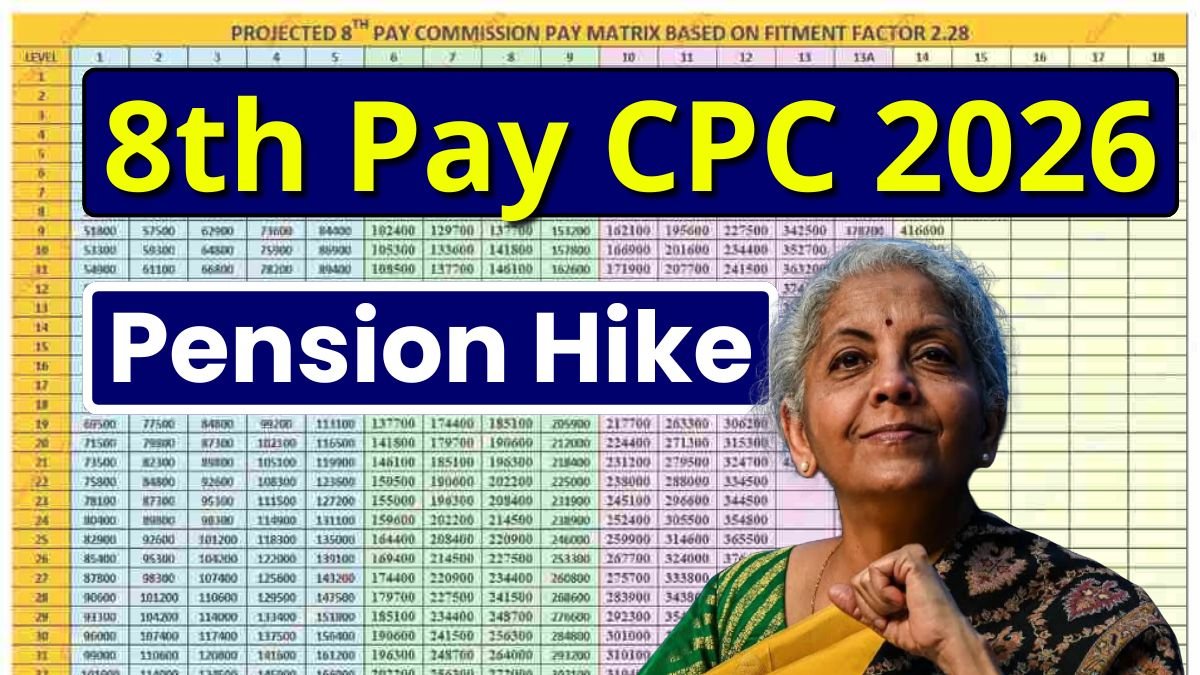When the Government of India issued a gazette notification for the 8th Central Pay Commission (CPC) on November 3, the news brought hope to many government employees. But that hope didn’t last long.
Soon after, the All India Trade Union Congress (AITUC) raised a major concern — they claim nearly 69 lakh pensioners and family pensioners have been excluded from the purview of the 8th CPC. If that’s true, what does it mean for those who’ve dedicated their entire lives to serving the nation?
Why Pensioners Are Worried
According to Amarjeet Kaur, General Secretary of AITUC, the government’s Terms of Reference (ToR) for the 8th Pay Commission show “complete indifference” towards both working employees and elderly pensioners.
Her main allegation? The Modi government has “betrayed” pensioners by using the Finance Bill to keep them outside the commission’s scope. This means the government now holds the power to decide—without the CPC’s input—whether existing pensions will be revised or not.
Think about it: lakhs of retired employees, who once built the very institutions we depend on, might not see any increase in their pension from January 1, 2026 onward. That’s a serious blow to their financial security and dignity.
What the AITUC Is Saying
The AITUC has been vocal about its disappointment. According to them, the ToR given to the 8th CPC is so restrictive that it prevents any recommendation for a “decent living wage.”
In simpler terms, the commission isn’t allowed to suggest salaries that match today’s rising cost of living. That’s a problem, especially when government staff in many departments are already doing the work of two people due to massive staff shortages.
10 Lakh Vacant Posts and Growing Pressure
Here’s something shocking — there are reportedly over 10 lakh vacant posts across ministries and departments.
Instead of filling these roles, the government is increasingly relying on fixed-term contracts and even rehiring retired personnel, particularly in the Railways and Defence.
Railway workers, including women loco pilots, are reportedly working 12-hour shifts without basic facilities. You can imagine how demoralizing this can be. And now, with the 8th CPC’s restrictive scope, their morale could sink even further.
What About the Old Pension Scheme (OPS)?
For years, government employees have been demanding the restoration of the Old Pension Scheme (OPS)—a non-contributory pension model that ensured security after retirement.
However, the 8th CPC’s ToR doesn’t even mention OPS. Instead, employees continue under the contributory NPS (National Pension System) or UPS, which many feel is unfair.
After the Finance Bill’s approval, the government effectively took away the 8th CPC’s authority to revise pensions for 69 lakh existing pensioners. That means no adjustment to match inflation, no relief for the elderly, and a lot of disappointment.
Why Employees Feel Demoralized
Imagine dedicating 30 years of your life to public service—working overtime, often with limited facilities—and then realizing your post-retirement benefits won’t keep up with basic living costs.
That’s the reality many central government employees fear. The absence of a fair pension structure and the lack of clear direction on pay hikes have left both working staff and retirees frustrated.
What AITUC Wants the Government to Reconsider
AITUC has put forward several key demands that could restore balance and fairness:
- A living wage for employees — based on a family of five, accounting for essential expenses like food, housing, health, and education.
- Restoration of the Old Pension Scheme (OPS) — replacing the contributory NPS/UPS model.
- Pension revision and structure improvements — including restoring the commuted value after 11 years and increasing pension by 5% every five years, as suggested by the Parliamentary Standing Committee.
- Implementation date — 8th CPC recommendations should be effective from January 1, 2026.
The Bigger Picture: What’s Next?
AITUC has called upon central government employees and unions to unite and protest what they describe as the government’s anti-employee and anti-pensioner attitude.
The organization believes the only way to ensure justice is through collective action, especially since salary and pension revisions happen just once every 10 years.
Whether the government responds positively remains to be seen, but one thing is certain — the 8th Pay Commission’s impact will shape the financial future of millions of employees and retirees for the next decade.
Frequently Asked Questions
Q1. What is the main controversy surrounding the 8th Pay Commission?
The biggest concern is that nearly 69 lakh pensioners and family pensioners have been excluded from its purview, meaning their pensions may not be revised from January 2026.
Q2. Will the Old Pension Scheme (OPS) be restored under the 8th CPC?
As of now, there’s no mention of OPS in the 8th CPC’s Terms of Reference, despite growing demands from employees and trade unions.
Q3. Why are employees and unions protesting?
They believe the ToR unfairly limits the commission’s ability to recommend higher pay or better pensions, which could hurt both working staff and retirees already struggling with inflation.
